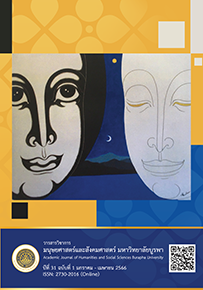The Convergence Social Media Implementations among Gay and Transgender Spirit Mediums and Sacred Ritual Specialists during COVID-19 Pandemic
Main Article Content
Abstract
This study explored the ways in which gay and transgender spirit mediums and sacred ritual specialists implemented convergence social media to communicate with their followers, especially LGBTIQ community, during the COVID-19 pandemic. Nine participants were recruited using purposive sampling. Qualitative research methodology was employed. In-depth interviews were conducted to collect data. The results showed that the informants developed various means on social media platforms to express their gender identities and differences. The cross-platform content creation strategy was also employed to effectively reach diverse groups of followers. Meanwhile, the means of communication were planned and evaluated systematically. According to the findings, gay and transgender spirit mediums and sacred ritual specialists played an important role in developing channels for communicating, counselling, as well as providing practical guidance during the pandemic, for LGBTIQ people who were experiencing various wellbeing problems. The study suggested that gay and transgender spirit mediums and sacred ritual specialists should be regarded as key stakeholders in developing participatory communication. This would help upgrade the quality of health services for LGBTIQ people in the future.
Downloads
Article Details

This work is licensed under a Creative Commons Attribution-NonCommercial-NoDerivatives 4.0 International License.
บทความทุกบทความเป็นลิขสิทธิ์ของวารสารวิชาการมนุษยศาสตร์และสังคมศาสตร์ มหาวิทยาลัยบูรพาเท่านั้น
References
กิ่งแก้ว ทิศตึง. (2559). ร่างทรงและพื้นที่ทางสังคมของคนข้ามเพศ. วารสารสังคมศาสตร์, 28(1), 87-108.
กิ่งแก้ว ทิศตึง. (2562). การสร้างพื้นที่ทางสังคมของคนข้ามเพศ: บทบาทของการเป็นผู้จัดเตรียมพิธีกรรมในพิธีกรรมฟ้อนผี. วารสารสตรีนิยมไทย: จุดยืน, 6(1), 32-46.
จารุวรรณ ขำเพชร. (2560). พื้นที่เมืองกับการดำรงอยู่ของร่างทรงเพศที่สามในสังคมไทย. วารสารวิชาการ เซาธ์อีสท์บางกอก (สาขามนุษยศาสตร์และสังคมศาสตร์), 3(1), 50-65.
ชาย โพธิสิตา. (2547). ศาสตร์และศิลป์แห่งการวิจัยเชิงคุณภาพ. อมรินทร์พริ้นติ้งแอนด์พับลิชชิ่ง.
ชาวีกรณ์ (นามสมมติ). (2564, 12 ธันวาคม). สัมภาษณ์.
เดชาชัย (นามสมมติ). (2564, 11 ธันวาคม). สัมภาษณ์.
เบลล่า (นามสมมติ). (2564, 9 ธันวาคม). สัมภาษณ์.
ปุณณฑรีย์ เจียวิริยบุญญา. (2564). มานุษยวิทยาการพยากรณ์: ประสบการณ์ในการพยากรณ์ดวงชะตาบนพื้นที่สื่อสังคมออนไลน์ในชีวิตประจำวันของชาวดิจิทัลไทย. มนุษยศาสตร์สาร, 22(2), 137-160.
พล เนื่องจำนงค์. (2559). พฤติกรรมการบริโภคสื่อบนเครือข่ายสังคมผ่านอินเทอร์เน็ตของผู้บริโภคแบบโพรซูเมอร์ในสังคมแห่งการหลอมรวมสื่อ. [วิทยานิพนธ์นิเทศศาสตรมหาบัณฑิต, มหาวิทยาลัยกรุงเทพ].
รณกร (นามสมมติ). (2564, 28 พฤศจิกายน). สัมภาษณ์.
ลพชัย (นามสมมติ). (2564, 8 ธันวาคม). สัมภาษณ์.
สุกัญญา บูรณเดชาชัย. (2561). วารสารศาสตร์หลอมรวม: แนวคิด หลักการ และกรณีศึกษาในประเทศไทย. แดเน็กซ์ อินเตอร์คอร์ปอเรชั่น.
อานันท์ กาญจนพันธุ์. (2535). ล้านนาในมิติทางวัฒนธรรม. คณะสังคมศาสตร์ มหาวิทยาลัยเชียงใหม่.
อารยา (นามสมมติ). (2564, 10 ธันวาคม). สัมภาษณ์.
โอริสา (นามสมมติ). (2564, 12 ธันวาคม). สัมภาษณ์.
Bhaesajsanguan, S. (2018). A Study of the influence of online fortune teller and ratings amongst Gen-Y female. [Master’s thesis, Thammasat University].
Campbell, A., & Tsuria, R. (2022). Digital religion: Understanding religious practice in digital media. Routledge.
De Lind van Wijngaarden, J. (2021). Male homosexuality in 21stcentury Thailand: A longitudinal study of young, rural, same-sex-attached men coming of age. Anthem Press.
Fiske, J. (2010). Understanding popular culture. Routledge.
Fongkaew, K., De Lind van Wijngaarden, J. W., Tepjan, S., Chonwanarat, N., Akkakanjanasupar P., & Newman, P. A. (2021). ‘No test, no disease’: Multilevel barriers to HIV testing among young men who have sex with men and transgender women in three semi-urban areas in Thailand. Culture, Health & Sexuality, 24(9), 1199-1214. https://doi.org/10.1080/13691058.2021.1938237
Fongkaew, W., & Fongkaew, K. (2016). My space, my body, my sexual subjectivity: Social media, sexual practice and parental control among teenage girls in urban Chiang Mai. Culture, Health & Sexuality, 18(5), 597-607.
Fongkaew, K. (2014). Beware of the giant monster and its minions: How schoolgirls negotiate sexual subjectivities in a conservative school climate in Chiang Mai, northern Thailand. Journal of Population and Social Studies, 22(2), 114-127.
Fongkaew, W., Settheekul, S., Fongkaew, K., & Surapagdee, N. (2011). Effectiveness of youth-led educational program on sexual and reproductive health for Thai early adolescents. Pacific Rim International Journal of Nursing Research, 15(2), 81-96.
Fongkaew, W., Fongkaew, K., & Suchaxaya, P. (2007). Early adolescent peer leader development in HIV prevention using youth-adult partnership with schools approach. Journal of the Association of Nurses in AIDS Care, 18(2), 60-71.
Hsieh, H. F., & Shannon, S. E. (2005). Three approaches to qualitative content analysis. Qualitative Health Research, 15(9), 1277-1288.
Jiaviriyaboonya, P. (2022). Anthropological study of village health volunteers’ (VHVs’) socio-political network in minimizing risk and managing the crisis during COVID-19. Heliyon, 8(1), e08654.
Kang, D. B. (2018). Surfing the Korean wave: Wonder gays and the crisis of Thai masculinity, Visual Anthropology, 31(1-2), 45-65.
Rueanrudipirom, K., Fongkaew, W., Viseskul, N., & Fongkaew, K. (2021). Lifestyle of young men who have sex with men living with HIV: A qualitative descriptive study. Pacific Rim International Journal of Nursing Research, 25(2), 312-326.
Tanabe, S. (1991). Spirits power and the discourse of female gender. In M. Chitakasem and A. Turton (Eds.), Thai constructions of knowledge. SOAS.


